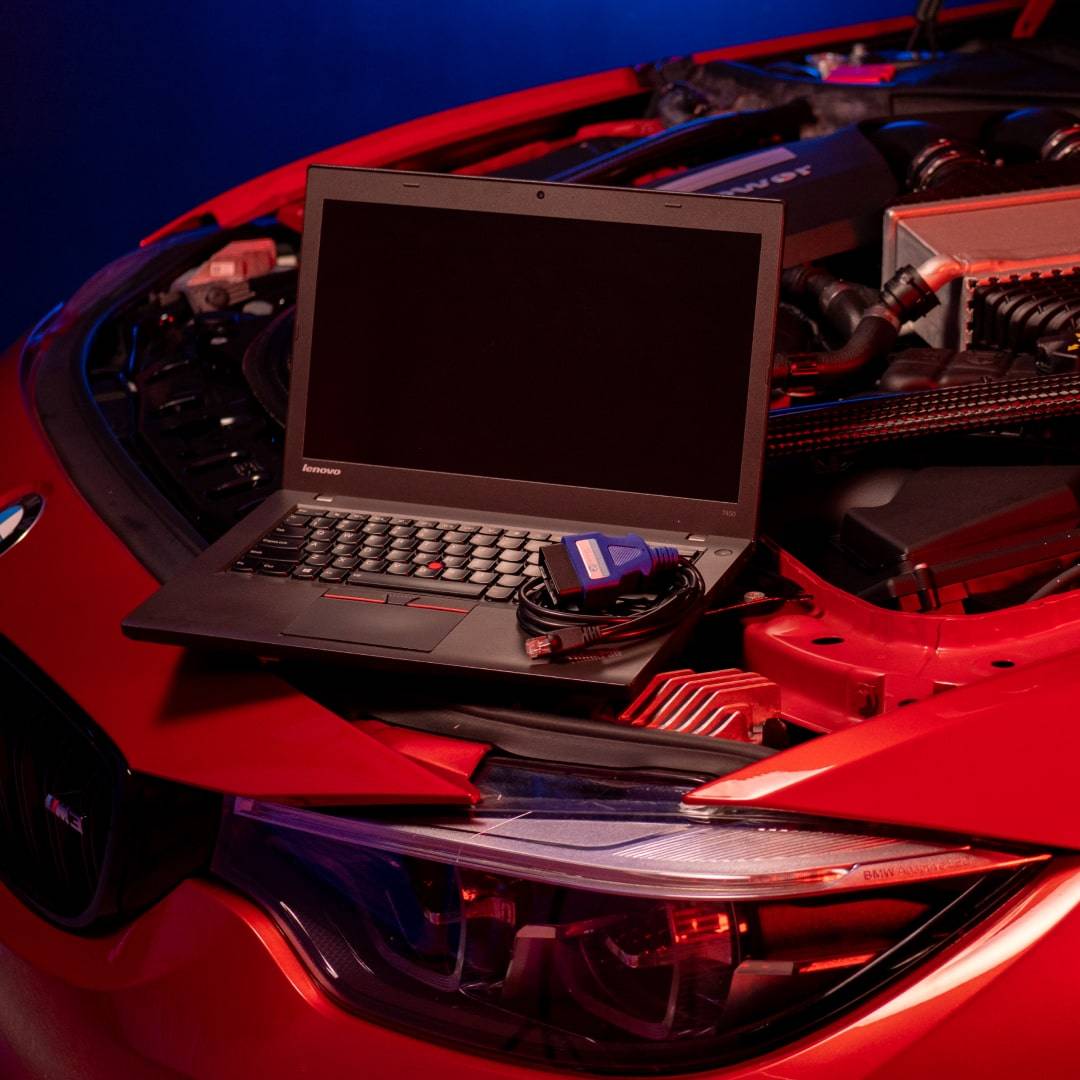[[post.title]]
Aug 7, 2023

The ECU tune is installed, tire pressure is at the optimal level, and you’ve got your Need for Speed playlist ready. The last thing left to do before you set out for a ride is to refuel your BMW. You visit the gas station and you’re faced with a dilemma – “Which fuel should I choose?”.
Obviously, the scenario is kind of exaggerated, since you would want to know the type of gas you’ll be using before getting your engine tuned. In fact, remaps are usually fuel-specific, since the octane rating determines how much you can achieve with BMW engine tuning. However, if you are considering having your car tuned, you’ll probably need to decide on that at some point.
So, let’s see how the gasoline selection affects engine tuning…
Before we go any further, it’s important to explain one of the more important characteristics of gasoline, the octane rating.
Simply put, it determines how well the fuel can resist a phenomenon known as detonation, more commonly called engine knocking. Which is when the ignition of the air-fuel pockets unburnt in the cylinder happens when it shouldn’t due to excessive heat and outside the combustion stroke. If you would like to learn more about engine strokes in general, check out our previous article on the types of gas.
There are different methods to measure octane ratings, including Research Octane Number (RON), Motor Octane Number (MON), and Anti-Knock Index (AKI). RON is the most widely used rating globally and is displayed on fuel pumps in Europe and Australia. It involves testing the fuel in controlled conditions to compare its knocking resistance to baseline mixtures.
In the United States, the displayed rating on fuel pumps is AKI, which is an average of RON and MON numbers. Additionally, specific fuel grade names are used to differentiate them:
And that’s to shortly explain it. Time to get into some high-performance applications.
The answer is pretty simple – the engine knocking resistance. Performance-oriented machines are usually used in a different manner than regular cars.
Let’s not kid each other: with so much power under your right foot, the temptation to use it is just too strong. Even when driving safely and within the legal limits. Obviously, you’ll sometimes want to merge onto the highway in a more dynamic way. For example, entering the ramp at a higher speed to feel the g-force push you to one side of your nicely bolstered car seat… Or flooring it to overtake some slowpoke on a single-lane road…
Regardless: performance rides are meant to be driven. Period.
And when they are being driven, they heat up. Especially the insides of their combustion chambers. Turbochargers in forced induction cars, high compression ratios for naturally aspirated ones, or sometimes even both… All the things that let them achieve the best performance. generate higher cylinder pressures, making the engine more susceptible to knocking.
Although your car shouldn’t die from that and it can sometimes happen even in normal cars under regular operating conditions, it’s not something you want to ignore. In the long run, engine knocking will negatively impact longevity.
To temporarily remedy knocking, the ECU will retard the ignition timing, which will result in limited power output. At the same time, a check engine control should also light up on your dashboard and many modern vehicles will also go into what’s called “limp mode” (it sometimes has its own dash light). Usually, this mode of operation will go away only after the appropriate error code has been removed – but it’s best to fix the issue at heart before erasing any codes.
Car makers do a couple of things to reduce the risk of engine knocking occurring in such extreme scenarios in the first place. One of them is factory tuning their most sporty vehicles for higher octane gas, apart from incorporating more efficient cooling systems.
It’s also a great opportunity to highlight how important fuel selection is for BMW engine tuning and tuned cars. So, let’s get straight to business!
 The type of fuel is one of the more important considerations that go into creating an engine remap. A BMW ECU tune will affect many parameters, one of them being the turbocharger’s peak boost pressure. Which, as we’ve established, can impact the temperatures within the combustion chamber.
The type of fuel is one of the more important considerations that go into creating an engine remap. A BMW ECU tune will affect many parameters, one of them being the turbocharger’s peak boost pressure. Which, as we’ve established, can impact the temperatures within the combustion chamber.
Of course, engine tuning also affects the operation of the cooling system. By making the fans run faster, the efficiency is increased, and the thermal load on the internal components gets reduced. However, even after the cooling is optimized via a tune when you start pushing your car, it will still heat up – just slower than on the stock map.
Interested in all the nooks and crannies, as well as different available methods of performance improvements? Check out our article about BMW ECU tuning.
Now with engine tunes, it’s very similar to factory high-performance cars. To make it possible for the engine to develop more power (thus, allowing for an increased boost, among other changes), the ECU gets reprogrammed to run on high-octane gasoline, negating engine knocking.
Okay, but let’s address the elephant in this article’s title.
Since you are here, we’re guessing you want to improve how your car behaves out there on the road. Or maybe you feel like your BMW or MINI lost this exciting feeling? The one you felt when you took it for a first ride and let loose, getting to know its driving characteristics.
Nevertheless, chances are you are researching the topic of engine tuning. If so, you are in the right place. Not only do we have the information you are looking for, we also might have a perfect solution for you. Check out the Awaken Performance by BimmerTech – the ECU tuning, perfected.
“Perfected” meaning a fully remote service with a focus on finding individualized solutions for each case and a wealth of experience in tuning BMW vehicles. Convenience is a key advantage of Awaken Performance. You can enjoy the entire process without leaving your driveway. If you go for it, you can expect improvements in three crucial aspects of your driving experience.
First of all, performance gains. You’ll get enhanced flexibility regardless of the gear you're in. We know what makes the car practical and pleasant to use in everyday scenarios – that’s why we don’t simply squeeze every last ounce of power out of your engine in the top end. We optimize ECU parameters to vastly improve engine responsiveness, as well as to increase power and torque by up to 25% where it matters the most: in the lower RPM ranges.
Results? The full potential of your BMW unleashed, providing full confidence during acceleration, overtaking, or merging on highways.
Another area where you'll see positive changes is fuel consumption. Our tune makes sure the injectors deliver a more precise fuel dose. Because of that, your BMW will exhibit around 10% better mileage under normal driving conditions, helping you reduce fuel costs. Assuming the average yearly mileage of around 15,000 miles, we’re looking at approximately $180–190 in savings.
Lastly, what our Awaken Performance tune improves is engine longevity. While having fun with your car is important, we also aim to extend its lifespan. Thanks to improved fuel dosage and the resulting changes in air-fuel ratio, the temperature of the exhaust gasses drops, which lowers the thermal load on the engine.
In most instances, the target engine operating temperature will also be adjusted, to further aid in better cooling. All of the above is meant to reduce wear on its internal components, preserving its performance and reliability for years to come.
To address concerns about safety, our experienced tuners handle the complex aspects of the process. You just book the remote tuning session, install the required software, and connect your laptop to the car's OBD port. We do the rest.
The process involves:
Afterward, final logging will be required to collect the required engine data and introduce any potential adjustments to ensure optimal performance and reliability. The safety and longevity of your ride is our priority!
 The higher, the better.
The higher, the better.
…In all seriousness though: preparing the tune for a specified, higher octane rating of gasoline will increase the tuning potential of the engine. As explained above, the knocking resistance of such fuel will make it much easier to extract better performance out of it.
But what gas is best for BMW with a tune? We strongly recommend 93 octane gas (RON 98 in Europe). That being said, we also have tunes for 91 octane gas if that’s what you prefer or have easier access to – simply choose the octane rating of your choice while placing an order for the Awaken Performance tune.
It might not seem like much when we’re talking about normal cars, but when it comes to tuned vehicles, fuel selection is actually a part of taking good care of them.
Additionally, now that you know the differences between various fuel grades across the United States (and the globe, for that matter), you can enjoy greater peace of mind when going for a long road trip to a different state. Or make a well-informed decision when it comes to choosing a tune for your car.
By the way – how popular is the 93 premium gas in your region? Did you ever come across something rated higher than that? Let us know in the comments!
Customer Reviews
Comments
Rate the product
This email is already registered.
Please Log In to continue.
Customer Reviews
Comments
Rate the product
This email is already registered.
Please Log In to continue.
[[comment.name]]
[[comment.text|raw]]
BimmerTech
Newsletter
[[comment.name]]
[[comment.text|raw]]
BimmerTech